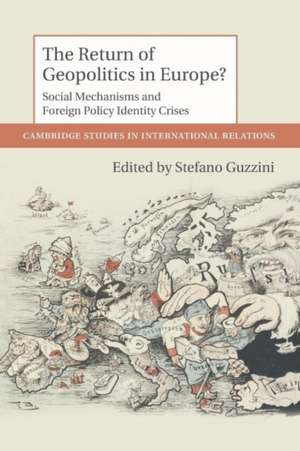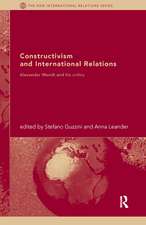The Return of Geopolitics in Europe?: Social Mechanisms and Foreign Policy Identity Crises: Cambridge Studies in International Relations, cartea 124
Editat de Stefano Guzzinien Limba Engleză Paperback – 21 aug 2013
| Toate formatele și edițiile | Preț | Express |
|---|---|---|
| Paperback (1) | 289.95 lei 43-57 zile | |
| Cambridge University Press – 21 aug 2013 | 289.95 lei 43-57 zile | |
| Hardback (1) | 788.22 lei 43-57 zile | |
| Cambridge University Press – 24 oct 2012 | 788.22 lei 43-57 zile |
Din seria Cambridge Studies in International Relations
-
 Preț: 200.85 lei
Preț: 200.85 lei -
 Preț: 232.37 lei
Preț: 232.37 lei -
 Preț: 237.58 lei
Preț: 237.58 lei -
 Preț: 198.89 lei
Preț: 198.89 lei -
 Preț: 210.69 lei
Preț: 210.69 lei -
 Preț: 200.41 lei
Preț: 200.41 lei -
 Preț: 190.01 lei
Preț: 190.01 lei - 8%
 Preț: 401.23 lei
Preț: 401.23 lei -
 Preț: 229.56 lei
Preț: 229.56 lei -
 Preț: 265.70 lei
Preț: 265.70 lei -
 Preț: 200.08 lei
Preț: 200.08 lei -
 Preț: 207.81 lei
Preț: 207.81 lei -
 Preț: 158.77 lei
Preț: 158.77 lei -
 Preț: 162.49 lei
Preț: 162.49 lei -
 Preț: 231.47 lei
Preț: 231.47 lei - 11%
 Preț: 584.77 lei
Preț: 584.77 lei -
 Preț: 241.77 lei
Preț: 241.77 lei -
 Preț: 287.87 lei
Preț: 287.87 lei -
 Preț: 209.12 lei
Preț: 209.12 lei -
 Preț: 299.22 lei
Preț: 299.22 lei -
 Preț: 286.13 lei
Preț: 286.13 lei -
 Preț: 287.87 lei
Preț: 287.87 lei - 11%
 Preț: 641.67 lei
Preț: 641.67 lei - 11%
 Preț: 585.78 lei
Preț: 585.78 lei - 14%
 Preț: 843.23 lei
Preț: 843.23 lei -
 Preț: 303.80 lei
Preț: 303.80 lei -
 Preț: 284.78 lei
Preț: 284.78 lei -
 Preț: 279.76 lei
Preț: 279.76 lei -
 Preț: 285.75 lei
Preț: 285.75 lei -
 Preț: 324.24 lei
Preț: 324.24 lei -
 Preț: 290.16 lei
Preț: 290.16 lei -
 Preț: 291.69 lei
Preț: 291.69 lei -
 Preț: 392.52 lei
Preț: 392.52 lei
Preț: 289.95 lei
Nou
Puncte Express: 435
Preț estimativ în valută:
55.49€ • 57.58$ • 46.38£
55.49€ • 57.58$ • 46.38£
Carte tipărită la comandă
Livrare economică 17-31 martie
Preluare comenzi: 021 569.72.76
Specificații
ISBN-13: 9781107676503
ISBN-10: 1107676509
Pagini: 342
Ilustrații: 4 b/w illus. 1 table
Dimensiuni: 152 x 229 x 19 mm
Greutate: 0.5 kg
Editura: Cambridge University Press
Colecția Cambridge University Press
Seria Cambridge Studies in International Relations
Locul publicării:New York, United States
ISBN-10: 1107676509
Pagini: 342
Ilustrații: 4 b/w illus. 1 table
Dimensiuni: 152 x 229 x 19 mm
Greutate: 0.5 kg
Editura: Cambridge University Press
Colecția Cambridge University Press
Seria Cambridge Studies in International Relations
Locul publicării:New York, United States
Cuprins
Introduction. The argument: geopolitics for fixing the coordinates of foreign policy identity Stefano Guzzini; Part I. The Analytical Framework: 1. Which puzzle? An expected return of geopolitical thought in Europe? Stefano Guzzini; 2. Which geopolitics? Stefano Guzzini; 3. The framework of analysis: geopolitics meets foreign policy identity crises Stefano Guzzini; Part II. Case Studies: 4. Czech geopolitics: struggling for survival Petr Drulák; 5. The theme that dare not speak its name: geopolitik, geopolitics and German foreign policy since unification Andreas Behnke; 6. Geopolitics 'in the land of the prince': a passe-partout to (global) power politics? Elisabetta Brighi and Fabio Petito; 7. Turkey's 'geopolitics dogma' Pinar Bilgin; 8. Banal Huntingtonianism: civilisational geopolitics in Estonia Merje Kuus; 9. Russia: geopolitics from the heartland Alexander Astrov and Natalia Morozova; Part III. Empirical and Theoretical Conclusions: 10. The mixed revival of geopolitics in Europe Stefano Guzzini; 11. Social mechanisms as micro-dynamics in constructivist analysis Stefano Guzzini.
Recenzii
'A must-read for students of international relations theory, international security, and European studies, The Return of Geopolitics in Europe? by Stefano Guzzini and collaborators combines theory making, methodological innovation and comparative empirical analysis to deliver an outstanding and important book. This is not only because of the book's compelling answer to the puzzle of why a geopolitical school of thought began thriving in parts of Europe after the Cold War's peaceful end, but also as an exemplar of how excellent and rigorous constructivist theoretical and empirical research can and should be done.' Emanuel Adler, Andrea and Charles Bronfman Chair of Israeli Studies, University of Toronto
'The revival of explicit geopolitical thinking in Europe (and elsewhere) in the aftermath of the Cold War has not received much scholarly attention. Rather than just providing case studies, this book offers an innovative way of thinking about why such ideas arose more strongly in some European countries than in others and consequently provides an original sociological account of how the revival happened the way it did. It will be of wide interest to scholars in constructivist international studies, political sociology, and political geography.' John Agnew, University of California, Los Angeles, and author of Geopolitics: Re-Visioning World Politics
'Guzzini has put together a tightly argued study of how and why 1989 triggered a revival of geopolitical thinking in some European countries but not others. This book combines novel empirical cases with theoretical developments in constructivist process-tracing, and will be of particular interest both to those interested in comparative foreign policy analysis and those engaged with the impact of 1989.' Barry Buzan, Emeritus Professor of International Relations, London School of Economics and Political Science
'Stefano Guzzini and collaborators have produced a first-rate book that delivers on multiple fronts. Students of European politics will find thoughtful - and thought-provoking - analysis of the return of geopolitical thought in post-Cold War Europe. International relations theorists will gain new insights on how foreign policy starts at home. These substantive and analytic findings are then used to push constructivism in exciting directions - to new understandings and applications of methods (process tracing) and concepts (mechanisms) that for too long have been neglected by interpretivists. In sum, Guzzini's book delivers substantively, theoretically and methodologically - an all-too-rare trilogy in our profession!' Jeffrey T. Checkel, Simons Chair in International Law and Human Security, Simon Fraser University, and Peace Research Institute Oslo
'Guzzini's puzzle is an interesting one, which whilst set up against realist arguments in International Relations also speaks to research in Political Geography. Whereas some in critical geopolitics may have moved beyond foreign policy analysis and the book's self-diagnosed state-anthropomorphising conception of identity, the collection of essays included in the book are a must for any student of contemporary European geopolitics. Moreover, Guzzini's excellent discussion of realism and geopolitics could have made for a much-needed stand-alone journal article.' Ian Klinke, Political Geography
'There is much useful reflection in the first three chapters that rewards a close reading. This includes a consideration of the relationship of neoclassical geopolitics to realism in international relations … The case studies that follow are a significant strength of the book.' James D. Sidaway, Society and Space
'The revival of explicit geopolitical thinking in Europe (and elsewhere) in the aftermath of the Cold War has not received much scholarly attention. Rather than just providing case studies, this book offers an innovative way of thinking about why such ideas arose more strongly in some European countries than in others and consequently provides an original sociological account of how the revival happened the way it did. It will be of wide interest to scholars in constructivist international studies, political sociology, and political geography.' John Agnew, University of California, Los Angeles, and author of Geopolitics: Re-Visioning World Politics
'Guzzini has put together a tightly argued study of how and why 1989 triggered a revival of geopolitical thinking in some European countries but not others. This book combines novel empirical cases with theoretical developments in constructivist process-tracing, and will be of particular interest both to those interested in comparative foreign policy analysis and those engaged with the impact of 1989.' Barry Buzan, Emeritus Professor of International Relations, London School of Economics and Political Science
'Stefano Guzzini and collaborators have produced a first-rate book that delivers on multiple fronts. Students of European politics will find thoughtful - and thought-provoking - analysis of the return of geopolitical thought in post-Cold War Europe. International relations theorists will gain new insights on how foreign policy starts at home. These substantive and analytic findings are then used to push constructivism in exciting directions - to new understandings and applications of methods (process tracing) and concepts (mechanisms) that for too long have been neglected by interpretivists. In sum, Guzzini's book delivers substantively, theoretically and methodologically - an all-too-rare trilogy in our profession!' Jeffrey T. Checkel, Simons Chair in International Law and Human Security, Simon Fraser University, and Peace Research Institute Oslo
'Guzzini's puzzle is an interesting one, which whilst set up against realist arguments in International Relations also speaks to research in Political Geography. Whereas some in critical geopolitics may have moved beyond foreign policy analysis and the book's self-diagnosed state-anthropomorphising conception of identity, the collection of essays included in the book are a must for any student of contemporary European geopolitics. Moreover, Guzzini's excellent discussion of realism and geopolitics could have made for a much-needed stand-alone journal article.' Ian Klinke, Political Geography
'There is much useful reflection in the first three chapters that rewards a close reading. This includes a consideration of the relationship of neoclassical geopolitics to realism in international relations … The case studies that follow are a significant strength of the book.' James D. Sidaway, Society and Space
Descriere
A comparative study of the relationship between the end of the Cold War and the resurgence of geopolitics in Europe.












